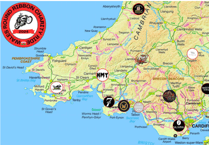Trellech based archaeologist Katie Churchill has been working with a hidden gem on the western border of Monmouthshire,in a small hamlet just outside Gilwern.
St Elli’s Church in Llanelly - built in the 1200s - is likely on the site of an earlier church. It is dedicated to either St. Ellyw, the daughter or grand-daughter of Brychan, a legendary king of Brecknockshire in the 5th century, after whom Brecon is named; or St Elli, the 6th century Abbot of Llancarfan, a monastery near Barry. The name suggests a 5-6th century foundation.
Surrounding the church is a ring of yew trees that are prominent in the graveyard creating a dark, yet welcoming atmosphere. The trees are older than the Church itself and they define a ringed enclosure that resembles the nearby Iron Age homestead Crug-y-gaer.
It has been used a special place for a very long time. It is situated on an elevated plateau on the south-western slopes of the Usk Valley, overlooking the Sugar Loaf and the Black Mountains. For those with a fear of heights, it is best to enter the churchyard from the south-west.
Four graveyards that surround the church, this in itself is extraordinary and highlights the importance of the site for the parishioners who have chosen to continue going to this remote location rather than build a new, more convenient church on the lower ground.
It is full with gravestones. Two particularly eye-catching ones were Joshua Morgan in 1871, who at 20 years old died as a result of the incident with the Cymro engine of the Clydach Railway, and Lt Colonel Robert Preston Sandeman of the Royal Gloucester Hussars who had an emotive statue of his dog across his grave. The site is reminiscent of Arnos Vale in Bristol, which has been internationally recognised as one of Britain’s best examples of a Victorian garden cemetery, however St Elli’s is far more intimate, spiritual and tranquil.
Katie Churchill has been a commercial archaeologist for sixteen years, working all over England until she moved to Trellech just over four years ago and met well known local archaeologist Steve Clarke. Since then, she has worked exclusive in Monmouthshire, which is littered in archaeological remains.
She told the Chronicle: “Every week I am astonished by the history that survives here and I very much like to share my experiences.”



